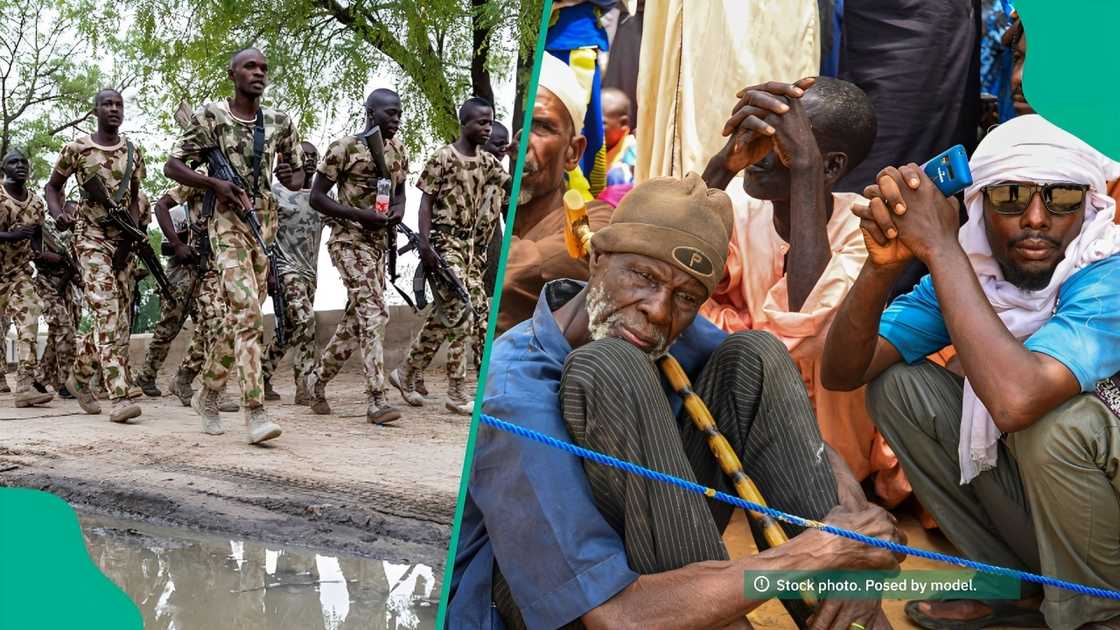Insecurity: Bartering with Bandits, by Folorunso Fatai Adisa
Editor’s note: In this piece, Folorunso Fatai Adisa tells how Nigeria’s uneasy dealings with bandits unmask both survival instincts and state weakness. The communication specialist shows why peace bought with ransom carries lasting consequences.
States claim it as creed: they do not negotiate with terrorists. The phrase carries the chill of gospel in the corridors of power, a line governments recite as though legitimacy itself depends on it. Yet in the open plains and dusty byways of Nigeria, where bandit lords hold sway and communities cower, that iron law buckles, and sometimes shatters, under the weight of desperation.

Source: Getty Images
The familiar refrain, “We don’t negotiate with terrorists,” is not empty rhetoric in Western democracies. The G8 in 2013 solemnly pledged to prohibit ransom payments to terrorists, a moral line drawn in the sand. Still, history tells a subtler story. Governments occasionally yield to necessity. France and Spain both paid ransoms for hostages taken by ISIS, a cold logic acknowledging that lives caught in crossfire may sometimes outweigh principle. In Nigeria, scholars at the National Institute for Legislative and Democratic Studies (NILDS) articulate this tension in starker terms: rejecting outright negotiation may bolster authority, but it can also cost lives, turning political prudence into Kafkaesque tragedy. They argue for strategic, conditional dialogue, not as surrender, but as a temporary measure when all else fails.
Consider the Niger Delta, where a formal negotiation gave birth to the 2009 Amnesty Programme. Militants laid down their guns for a promise: stipends, training, and reintegration. Oil flowed again. Death ebbed. That moment was not weakness but a strange kind of strength, a closing of wounds with words rather than war. Yet when Boko Haram struck and carried off the Chibok girls, the situation became more tangled. In 2017, in the shadow of global outrage, Nigeria conducted a prisoner exchange: captured militants for 82 young women. Without gloss, without apology, policy bowed to urgency. The government found itself in the awkward theatre of negotiation, with none of the grace of neutrality, but with the gravity of moral necessity. These examples illustrate the delicate calculus of governance: weighing principle against the immediate imperative to protect citizens.
In Zamfara State, the story played out in an even more desperate key. Bagega, a community under siege, was sealed off by bandits. Markets were silent, farms abandoned, families trapped not by law but by fear. The villagers were negotiating from ruin, not hope. With the Emir’s reluctant approval, a peace meeting was arranged with Ado Alero and Najaja, bandit figures who held power without legitimacy. Their demands were cruel and transactional: thirty million naira ransom, motorcycles, withdrawal from vigilante groups, and access to markets for herders. In return came the release of captives and safe passage to the fields. Within days, hostages returned home and commerce stirred again. This was not a bargain between equals, but an act of survival, and a stark reminder of the consequences when the state cannot project authority.
Here lies the searing truth: negotiation becomes necessary in places where the state fails to protect. When governments shrink behind protocols, communities step in to barter their peace, becoming reluctant diplomats in ungoverned spaces. But such gestures are double-edged. Policy analyses warn that ad hoc peace may affirm criminal legitimacy and encourage future banditry. Indeed, empirical studies by SBM Intelligence and the Global Terrorism Index confirm this carnivorous cycle: ransom payments enrich armed groups, fund their expansion, and invite new abductions. Nigeria, with over 3,600 people abducted between 2020 and 2022, demonstrates how ransom has evolved from sporadic crime into an entrenched industry of fear. The state pays, the bandits feast, and insecurity deepens.

Source: Getty Images
Picture this: a farmer’s daughter, barefoot, returns at sunset through markets reborn, markets once ghosted by fear, now stirring with tentative voices. This is Adichie’s human flicker in the fray. And then imagine Soyinka’s sharp glare: the moral inversion of a state that negotiates with criminals, praising the powerless at the altar of expedience. If the state kneels before criminals, what does it broadcast? Where does justice stand when peace is bought? As Audrey Kurth Cronin asserts, negotiation must only occur when the state speaks from a position of strength, not from its knees, preserving the authority and legitimacy of governance.
From this interweaving of tragedy and difficult choices, three imperatives emerge. First, the state must reassert its capacity. Force and intelligence should be precise and disciplined, robust enough to make negotiation an exception rather than habit. Second, if dialogue must occur, it must be conditional: demanding surrender, not submission; prohibiting blanket amnesty for killers; and ensuring trials, with potential leniency, as incentives for transformation rather than validation of terror. Third, dialogue channels must be elevated. Professional, discreet negotiation, not public plea, must guide citizen protection, with religious and community leaders engaged not as mediators of weakness, but as calibrators of peace. These imperatives link morality with governance, demonstrating that legitimacy requires both principle and prudence.
Truthfully, peace without justice is an illusion. Nigeria must abandon its reputation as a state perpetually caught between bravado and capitulation. Negotiation can only serve as a stopgap, never as a strategy. The state’s persistence, not surrender, must define its character. Guns should fall silent not because we pleaded, but because we demonstrated the capacity to stand firm without yielding to fear. For the girl in the fields, the terrified market seller, and the child whose school stands half empty, the government must cease borrowing dignity from its people’s desperation. A republic’s true strength is measured not by what it concedes, but by the courage it displays in refusing to surrender, a courage that signals both justice and authority.
Folorunso Fatai Adisa is a communication specialist and columnist for the Punch Newspaper (Friday Paper). He holds a Master’s degree in Media and Communication from the University of Strathclyde, Glasgow, and writes from the United Kingdom.
Disclaimer: The views and opinions expressed here are those of the author and do not necessarily reflect the official policy or position of Legit.ng.
Proofreading by James Ojo, copy editor at Legit.ng.
Source: Legit.ng




